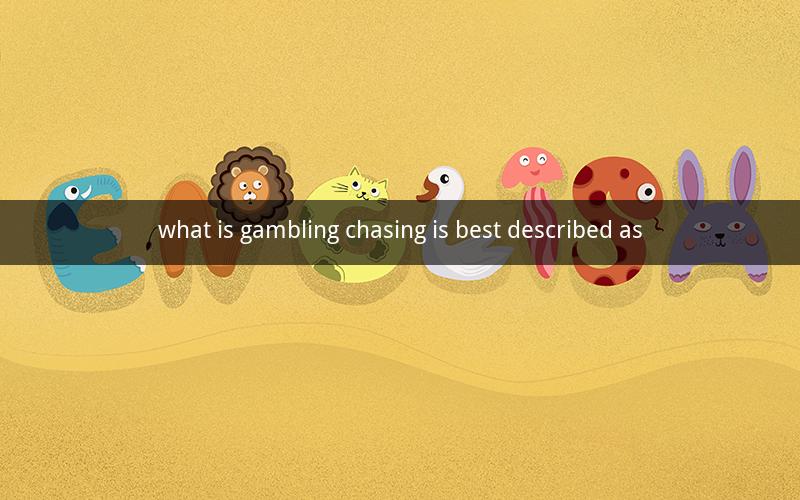
Directory
1. Introduction to Gambling Chasing
2. Understanding the Concept of Chasing
3. The Psychology Behind Chasing
4. Common Chasing Patterns in Gambling
5. The Risks of Chasing in Gambling
6. Strategies to Avoid Chasing in Gambling
7. The Impact of Chasing on Personal Finance
8. Case Studies: Real-Life Examples of Chasing
9. Legal and Ethical Considerations
10. Conclusion
Introduction to Gambling Chasing
Gambling chasing, a term often used in the world of gambling, refers to the behavior of a player who continues to place bets or engage in gambling activities despite losing money. This compulsive pursuit of a win can lead to significant financial and emotional consequences. In this article, we will delve into the concept of chasing, its psychological underpinnings, common patterns observed, the risks involved, strategies to avoid it, its impact on personal finance, real-life examples, and the legal and ethical considerations surrounding it.
Understanding the Concept of Chasing
Chasing is best described as a psychological phenomenon where individuals are driven to continue gambling in the hope of recouping their losses. This behavior is often rooted in the belief that the next bet will lead to a win, thus reversing the previous losses. The concept is closely related to the gambler's fallacy, which is the misconception that past events can influence future outcomes in games of chance.
The Psychology Behind Chasing
The psychology of chasing is complex and can be influenced by several factors. One of the primary reasons individuals engage in chasing is the desire to avoid regret. The fear of "what if" scenarios can drive individuals to continue gambling in the hope of a reversal of fortune. Additionally, the release of dopamine, a neurotransmitter associated with pleasure, can create a sense of euphoria that reinforces the chasing behavior.
Common Chasing Patterns in Gambling
There are several common patterns observed in chasing behavior among gamblers. One of the most prevalent is the "martingale" strategy, where players double their bets after each loss in the hope of winning back their losses and a profit. Another pattern is the "binge gambling," where individuals engage in excessive gambling sessions, often driven by the desire to recoup their losses quickly.
The Risks of Chasing in Gambling
Chasing in gambling poses several risks. The most immediate risk is the potential for significant financial loss. As players continue to bet in an attempt to recoup their losses, they can quickly deplete their bankroll. Additionally, chasing can lead to emotional and psychological distress, including anxiety, depression, and substance abuse.
Strategies to Avoid Chasing in Gambling
To avoid chasing in gambling, it is crucial to implement effective strategies. One of the most important strategies is to set a budget and stick to it. This ensures that gambling remains a form of entertainment rather than a means to recoup financial losses. Another strategy is to take regular breaks from gambling to prevent the escalation of chasing behavior.
The Impact of Chasing on Personal Finance
Chasing in gambling can have severe consequences on personal finance. The relentless pursuit of a win can lead to significant debt, financial strain, and even bankruptcy. It is essential for individuals to recognize the potential impact of chasing on their financial well-being and seek help if needed.
Case Studies: Real-Life Examples of Chasing
Several case studies illustrate the devastating impact of chasing in gambling. One such case involves a professional gambler who, despite winning millions, continued to chase losses, eventually leading to financial ruin. Another example is a casual gambler who, after a series of losses, spiraled into a deep depression, which was exacerbated by the pursuit of a win.
Legal and Ethical Considerations
The legal and ethical considerations surrounding chasing in gambling are significant. Many jurisdictions have laws in place to protect individuals from the dangers of chasing, including mandatory self-exclusion programs and responsible gambling initiatives. Ethically, it is crucial for individuals to gamble responsibly and seek help if they find themselves chasing losses.
Conclusion
Gambling chasing is a complex psychological phenomenon that can have severe consequences for individuals and their finances. Understanding the concept, the psychological underpinnings, common patterns, risks, and strategies to avoid chasing is essential for responsible gambling. It is crucial for individuals to recognize the potential impact of chasing and seek help if needed.
Questions and Answers
1. What is the difference between chasing and the gambler's fallacy?
- Chasing is the behavior of continuing to gamble despite losses, while the gambler's fallacy is the belief that past events can influence future outcomes.
2. Why do some individuals engage in chasing behavior?
- Individuals may engage in chasing due to the desire to avoid regret, the release of dopamine, and the belief that the next bet will lead to a win.
3. What are some common chasing patterns in gambling?
- Common patterns include the martingale strategy and binge gambling.
4. How can chasing lead to financial distress?
- Chasing can lead to significant financial loss, debt, and even bankruptcy.
5. What are some strategies to avoid chasing in gambling?
- Setting a budget, taking regular breaks, and seeking help if needed are effective strategies to avoid chasing.
6. How can chasing impact personal finance?
- Chasing can lead to financial strain, debt, and even bankruptcy.
7. What legal measures are in place to protect individuals from chasing?
- Many jurisdictions have self-exclusion programs and responsible gambling initiatives to protect individuals from the dangers of chasing.
8. Can chasing lead to emotional and psychological distress?
- Yes, chasing can lead to anxiety, depression, and substance abuse.
9. What are some real-life examples of chasing in gambling?
- There are numerous case studies of individuals who have experienced financial and emotional devastation due to chasing.
10. How can individuals seek help if they find themselves chasing?
- Individuals can seek help through counseling services, support groups, and self-help resources designed to address gambling-related issues.